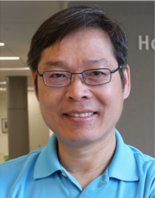EP 1142B - Defining the Role of Lipid Droplets in Muscle Stem Cell Function: What do the lipids do in the cells?
Expert in skeletal muscle cells and the influence of lipids on their functioning, especially lipid droplets, Dr. Kuang is the cancer center chair in STEM biology at Purdue University, and is also in the Center for Cancer Research, as well as in the Department of Biologic Sciences and the Department of Health and Kinesiology.

Featured Speaker:
Cancer Center Chair in Stem Cell Biology
Professor of Animal Sciences, Purdue University
Professor (since 2016) & Cancer Center Chair in Stem Cell Biology,
Dept. of Animal Sciences (64%) & Center for Cancer Research (36%),
Department of Biological Sciences (Courtesy),
Department of Health & Kinesiology (Courtesy),
Purdue University, West Lafayette, IN 47907
B.S. 1989, Nanchang University; M.Sc. 1992, Chinese Academy of Sciences; Ph.D. 2002, University of Alberta
Postdoctoral Fellow/Associate 2002–2007, Washington University; Sprott Center for Stem Cell Research, Ottawa Hospital Research Institute
Assistant, Associate Professor 2008–2016, Purdue University
Kuang, Shihuan
Dr. Kuang is an expert in skeletal muscle and adipose tissue stem cells. He published >150 peer-reviewed articles that have together received >12,000 citations, with an H-index of 50. Dr. Kuang discovered a key role of stem cell niche in controlling the cell fate and regenerative function of skeletal muscle stem cells (Kuang et al, 2007, Cell; Kuang et al, 2008, Cell Stem Cell). The discovery was illustrated in Gilbert’s Developmental Biology and formed the intellectual basis for using muscle stem cells to treat diseases (WO Patent 2,007,059,612, commercialized by Satellos Bioscience). Dr. Kuang has also published a series of work on the role of NOTCH signaling and PTEN in muscle stem cells and regeneration (Wen et al, 2012, MCB; Liu et al, 2012, Development; Jiang et al, 2014, Dis Model Mech; Bi et al, 2016, eLife; Yue et al, 2016, Cell Reports; Yue et al, 2017, Nature Communications; Yue et al, 2021, Molecular Therapy). Related to adipocyte biology and metabolism, his group discovered that inhibition of Notch signaling promotes browning of white adipocytes and ameliorates obesity and Type 2 diabetes (Bi et al, 2014, Nature Medicine). He also developed nanoparticular drug delivery systems to specifically target Notch signaling in white adipose tissue to overcome obesity in mouse and pig models (Jiang et al, 2017, Molecular Therapy; Huang et al, 2020, iScience). The work has led to patents (PCT/US16/58997, PCT/US21/42867) that were commercialized by Adipo Therapeutics to treat obesity and Type 2 diabetes. Dr. Kuang contributed to the lineage tracing work that led to the discovery of the common developmental origin of brown adipocytes and skeletal muscles (Seale et al, 2007, Nature). This work was selected as the top 10 breakthroughs of the year by Science magazine. Research in the Kuang lab has been supported by USDA, NIH, MDA and industry sponsors. Dr. Kuang has trained 46 postdoctoral fellows and graduate students, many of them have since become independent researchers in USA, Japan and China. Dr. Kuang has served as an associate editor or an editorial board member of 9 journals, an ad hoc reviewer for >60 journals, and a member of >50 grant review panels (including serving as standing member of NIH’s skeletal muscle exercise physiology panel). Dr. Kuang has presented >100 talks at various institutions and conferences, including invited talks at FASEB Summer Research Conferences and EMBO workshops, and most recently, the Matthew Kauffman memorial stem cell lecture at Jackson laboratory (Aug. 2022).Cancer Center Chair in Stem Cell Biology
Professor of Animal Sciences, Purdue University
Professor (since 2016) & Cancer Center Chair in Stem Cell Biology,
Dept. of Animal Sciences (64%) & Center for Cancer Research (36%),
Department of Biological Sciences (Courtesy),
Department of Health & Kinesiology (Courtesy),
Purdue University, West Lafayette, IN 47907
B.S. 1989, Nanchang University; M.Sc. 1992, Chinese Academy of Sciences; Ph.D. 2002, University of Alberta
Postdoctoral Fellow/Associate 2002–2007, Washington University; Sprott Center for Stem Cell Research, Ottawa Hospital Research Institute
Assistant, Associate Professor 2008–2016, Purdue University